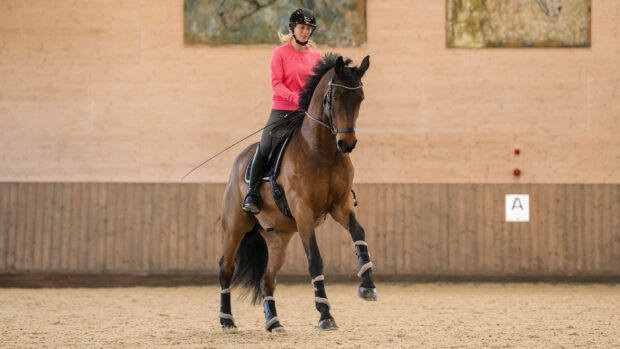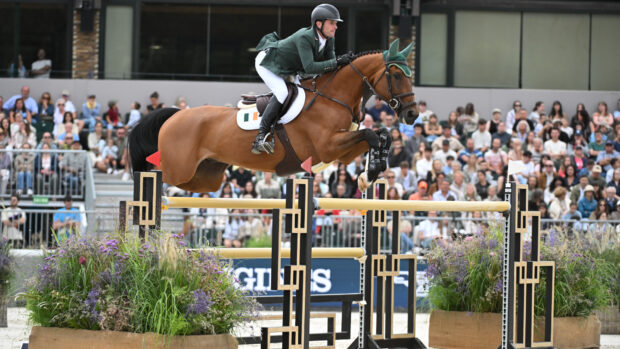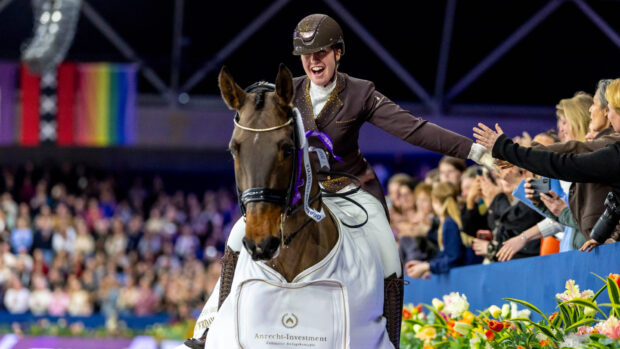We have previously discussed the first two levels of learning theory, which is the laws that govern how all animals learn. These were level one, association and sensitisation ; and level two, classical conditioning – predicting what will happen next. The third level is operant conditioning, which can be used to great effect in training desired behaviour.
When we use classical conditioning to train our horses, our primary aim is to change the animal’s emotional response to a stimulus, so that consequently their behaviour changes.
In contrast when we train using level three, or operant conditioning, our aim is to change their behaviour and, if done well, consequently their emotional state will change.
What is operant conditioning?
Operant conditioning – the third level of learning – can be summarised as rewards and consequences. This is how horses learn what to do (and not do) to make life enjoyable.
{"content":"PHA+VGhlIHRlcm1pbm9sb2d5IGlzIGluaXRpYWxseSBjb25mdXNpbmcgKHNlZSBkaWFncmFtLCBiZWxvdyksIGJ1dCBlc3NlbnRpYWxseSB0aGUgd29yZHMgcG9zaXRpdmUgYW5kIG5lZ2F0aXZlIG1lYW4gYWRkaXRpb24gb3Igc3VidHJhY3Rpb24gb2Ygc29tZXRoaW5nIOKAkyBhcyBpbiB0aGUgbWF0aGVtYXRpY2FsIHJhdGhlciB0aGFuIGVtb3Rpb25hbCBzZW5zZS48L3A+CjxwPjxzZWN0aW9uIGlkPSJlbWJlZF9jb2RlLTMxIiBjbGFzcz0iaGlkZGVuLW1kIGhpZGRlbi1sZyBzLWNvbnRhaW5lciBzdGlja3ktYW5jaG9yIGhpZGUtd2lkZ2V0LXRpdGxlIHdpZGdldF9lbWJlZF9jb2RlIHByZW1pdW1faW5saW5lXzIiPjxzZWN0aW9uIGNsYXNzPSJzLWNvbnRhaW5lciBsaXN0aW5nLS1zaW5nbGUgbGlzdGluZy0tc2luZ2xlLXNoYXJldGhyb3VnaCBpbWFnZS1hc3BlY3QtbGFuZHNjYXBlIGRlZmF1bHQgc2hhcmV0aHJvdWdoLWFkIHNoYXJldGhyb3VnaC1hZC1oaWRkZW4iPg0KICA8ZGl2IGNsYXNzPSJzLWNvbnRhaW5lcl9faW5uZXIiPg0KICAgIDx1bD4NCiAgICAgIDxsaSBpZD0ibmF0aXZlLWNvbnRlbnQtbW9iaWxlIiBjbGFzcz0ibGlzdGluZy1pdGVtIj4NCiAgICAgIDwvbGk+DQogICAgPC91bD4NCiAgPC9kaXY+DQo8L3NlY3Rpb24+PC9zZWN0aW9uPjwvcD4KPHA+UmVpbmZvcmNlbWVudCBtZWFucyBtYWtpbmcgYSBiZWhhdmlvdXIgbW9yZSBsaWtlbHksIHdoaWxlIHB1bmlzaG1lbnQgbWVhbnMgdGhleSBhcmUgbGVzcyBsaWtlbHkgdG8gb2ZmZXIgdGhhdCBiZWhhdmlvdXIgYWdhaW4gaW4gdGhlIGZ1dHVyZS48L3A+CjxwPjxpbWcgZmV0Y2hwcmlvcml0eT0iaGlnaCIgZGVjb2Rpbmc9ImFzeW5jIiBjbGFzcz0ibGF6eWxvYWQgYmx1ci11cCBhbGlnbm5vbmUgc2l6ZS1mdWxsIHdwLWltYWdlLTg4NzQ1MyIgZGF0YS1wcm9jZXNzZWQgc3JjPSJodHRwczovL2tleWFzc2V0cy50aW1laW5jdWsubmV0L2luc3BpcmV3cC9saXZlL3dwLWNvbnRlbnQvdXBsb2Fkcy9zaXRlcy8xNC8yMDE3LzAzL25ldy1oaC1wbGFjZWhvbGRlci0yMDB4MjAwLnBuZyIgZGF0YS1zcmM9Imh0dHBzOi8va2V5YXNzZXRzLnRpbWVpbmN1ay5uZXQvaW5zcGlyZXdwL2xpdmUvd3AtY29udGVudC91cGxvYWRzL3NpdGVzLzE0LzIwMjUvMDMvSEFINTA2LnZldF9sZWFybmluZ19wdF90d28uanBnIiBhbHQ9Im9wZXJhbnQgY29uZGl0aW9uaW5nIGRpYWdyYW0iIHdpZHRoPSIxNDAwIiBoZWlnaHQ9Ijc4OCIgZGF0YS1zaXplcz0iYXV0byIgZGF0YS1zcmNzZXQ9Imh0dHBzOi8va2V5YXNzZXRzLnRpbWVpbmN1ay5uZXQvaW5zcGlyZXdwL2xpdmUvd3AtY29udGVudC91cGxvYWRzL3NpdGVzLzE0LzIwMjUvMDMvSEFINTA2LnZldF9sZWFybmluZ19wdF90d28uanBnIDE0MDB3LCBodHRwczovL2tleWFzc2V0cy50aW1laW5jdWsubmV0L2luc3BpcmV3cC9saXZlL3dwLWNvbnRlbnQvdXBsb2Fkcy9zaXRlcy8xNC8yMDI1LzAzL0hBSDUwNi52ZXRfbGVhcm5pbmdfcHRfdHdvLTMwMHgxNjkuanBnIDMwMHcsIGh0dHBzOi8va2V5YXNzZXRzLnRpbWVpbmN1ay5uZXQvaW5zcGlyZXdwL2xpdmUvd3AtY29udGVudC91cGxvYWRzL3NpdGVzLzE0LzIwMjUvMDMvSEFINTA2LnZldF9sZWFybmluZ19wdF90d28tNjMweDM1NS5qcGcgNjMwdywgaHR0cHM6Ly9rZXlhc3NldHMudGltZWluY3VrLm5ldC9pbnNwaXJld3AvbGl2ZS93cC1jb250ZW50L3VwbG9hZHMvc2l0ZXMvMTQvMjAyNS8wMy9IQUg1MDYudmV0X2xlYXJuaW5nX3B0X3R3by0xMzV4NzYuanBnIDEzNXcsIGh0dHBzOi8va2V5YXNzZXRzLnRpbWVpbmN1ay5uZXQvaW5zcGlyZXdwL2xpdmUvd3AtY29udGVudC91cGxvYWRzL3NpdGVzLzE0LzIwMjUvMDMvSEFINTA2LnZldF9sZWFybmluZ19wdF90d28tMzIweDE4MC5qcGcgMzIwdywgaHR0cHM6Ly9rZXlhc3NldHMudGltZWluY3VrLm5ldC9pbnNwaXJld3AvbGl2ZS93cC1jb250ZW50L3VwbG9hZHMvc2l0ZXMvMTQvMjAyNS8wMy9IQUg1MDYudmV0X2xlYXJuaW5nX3B0X3R3by02MjB4MzQ5LmpwZyA2MjB3LCBodHRwczovL2tleWFzc2V0cy50aW1laW5jdWsubmV0L2luc3BpcmV3cC9saXZlL3dwLWNvbnRlbnQvdXBsb2Fkcy9zaXRlcy8xNC8yMDI1LzAzL0hBSDUwNi52ZXRfbGVhcm5pbmdfcHRfdHdvLTkyMHg1MTguanBnIDkyMHcsIGh0dHBzOi8va2V5YXNzZXRzLnRpbWVpbmN1ay5uZXQvaW5zcGlyZXdwL2xpdmUvd3AtY29udGVudC91cGxvYWRzL3NpdGVzLzE0LzIwMjUvMDMvSEFINTA2LnZldF9sZWFybmluZ19wdF90d28tMTIyMHg2ODcuanBnIDEyMjB3IiBzaXplcz0iKG1heC13aWR0aDogMTQwMHB4KSAxMDB2dywgMTQwMHB4IiAvPjwvcD4KPGgzPlBvc2l0aXZlIHJlaW5mb3JjZW1lbnQ8L2gzPgo8cD5UaGUgbW9zdCBjb21tb24gZm9ybSBvZiBwb3NpdGl2ZSByZWluZm9yY2VtZW50IHdlIHNlZSB3b3VsZCBiZSA8YSBocmVmPSJodHRwczovL3d3dy5ob3JzZWFuZGhvdW5kLmNvLnVrLm1hc3Rlci5wdWJsaWMua2V5c3RvbmUtcHJvZC1la3MtZXV3MS5mdXR1cmVwbGMuZW5naW5lZXJpbmcubWFzdGVyLnB1YmxpYy5rZXlzdG9uZS1wcm9kLWVrcy1ldXcxLmZ1dHVyZXBsYy5lbmdpbmVlcmluZy9ob3JzZS10cmFpbmluZy9jbGlja2VyLXRyYWluaW5nLWZvci1ob3JzZXMtODE1OTM0IiB0YXJnZXQ9Il9ibGFuayIgcmVsPSJub2ZvbGxvdyBub29wZW5lciI+Y2xpY2tlciB0cmFpbmluZzwvYT4uIEJlY2F1c2UgaG9yc2VzIGhhdmUgYSBzaG9ydCBzaG9ydC10ZXJtIG1lbW9yeSwgdGhlIGNsaWNrIGlzIHVzZWQgdG8gdGVsbCB0aGUgaG9yc2UgdGhlIGV4YWN0IHRpbWluZyBvZiB0aGUgYmVoYXZpb3VyIHlvdSB3YW50IOKAkyBwZXJmZWN0IHRpbWluZyBpcyB2ZXJ5IGltcG9ydGFudCBpbiB0cmFpbmluZy48L3A+Cgo8cD5UaGUgY2xpY2sgaXMgYWx3YXlzIGZvbGxvd2VkIGJ5IGEgcmV3YXJkOyB0aGlzIG1pZ2h0IGJlIGZvb2QsIGJ1dCBjb3VsZCBhbHNvIGJlIGEgbmljZSBzY3JhdGNoLiBUaGUgaG9yc2Ugd2lsbCB0aGVuIG9mZmVyIHRoZSBzYW1lIGJlaGF2aW91ciBhZ2FpbiB0byBnZXQgbW9yZSBvZiB3aGF0IHRoZXkgbGlrZSDigJMgZm9vZCBvciBzY3JhdGNoZXMuIE92ZXIgdGltZSB3ZSBjYW4gdHJhaW4gbW9yZSBjb21wbGV4IGJlaGF2aW91cnMuPC9wPgo8cD48ZGl2IGlkPSJhdHRhY2htZW50Xzg4NzQ2OSIgc3R5bGU9IndpZHRoOiAxNDEwcHgiIGNsYXNzPSJ3cC1jYXB0aW9uIGFsaWdubm9uZSI+PGltZyBkZWNvZGluZz0iYXN5bmMiIGFyaWEtZGVzY3JpYmVkYnk9ImNhcHRpb24tYXR0YWNobWVudC04ODc0NjkiIGNsYXNzPSJsYXp5bG9hZCBibHVyLXVwIHNpemUtZnVsbCB3cC1pbWFnZS04ODc0NjkiIGRhdGEtcHJvY2Vzc2VkIHNyYz0iaHR0cHM6Ly9rZXlhc3NldHMudGltZWluY3VrLm5ldC9pbnNwaXJld3AvbGl2ZS93cC1jb250ZW50L3VwbG9hZHMvc2l0ZXMvMTQvMjAxNy8wMy9uZXctaGgtcGxhY2Vob2xkZXItMjAweDIwMC5wbmciIGRhdGEtc3JjPSJodHRwczovL2tleWFzc2V0cy50aW1laW5jdWsubmV0L2luc3BpcmV3cC9saXZlL3dwLWNvbnRlbnQvdXBsb2Fkcy9zaXRlcy8xNC8yMDI1LzAzL1NjcmF0Y2gtRjhFWUYyLWFsYW15LmpwZyIgYWx0PSJTY3JhdGNoaW5nIGEgZ3JleSBob3JzZSdzIHdpdGhlciIgd2lkdGg9IjE0MDAiIGhlaWdodD0iNzg4IiBkYXRhLXNpemVzPSJhdXRvIiBkYXRhLXNyY3NldD0iaHR0cHM6Ly9rZXlhc3NldHMudGltZWluY3VrLm5ldC9pbnNwaXJld3AvbGl2ZS93cC1jb250ZW50L3VwbG9hZHMvc2l0ZXMvMTQvMjAyNS8wMy9TY3JhdGNoLUY4RVlGMi1hbGFteS5qcGcgMTQwMHcsIGh0dHBzOi8va2V5YXNzZXRzLnRpbWVpbmN1ay5uZXQvaW5zcGlyZXdwL2xpdmUvd3AtY29udGVudC91cGxvYWRzL3NpdGVzLzE0LzIwMjUvMDMvU2NyYXRjaC1GOEVZRjItYWxhbXktMzAweDE2OS5qcGcgMzAwdywgaHR0cHM6Ly9rZXlhc3NldHMudGltZWluY3VrLm5ldC9pbnNwaXJld3AvbGl2ZS93cC1jb250ZW50L3VwbG9hZHMvc2l0ZXMvMTQvMjAyNS8wMy9TY3JhdGNoLUY4RVlGMi1hbGFteS02MzB4MzU1LmpwZyA2MzB3LCBodHRwczovL2tleWFzc2V0cy50aW1laW5jdWsubmV0L2luc3BpcmV3cC9saXZlL3dwLWNvbnRlbnQvdXBsb2Fkcy9zaXRlcy8xNC8yMDI1LzAzL1NjcmF0Y2gtRjhFWUYyLWFsYW15LTEzNXg3Ni5qcGcgMTM1dywgaHR0cHM6Ly9rZXlhc3NldHMudGltZWluY3VrLm5ldC9pbnNwaXJld3AvbGl2ZS93cC1jb250ZW50L3VwbG9hZHMvc2l0ZXMvMTQvMjAyNS8wMy9TY3JhdGNoLUY4RVlGMi1hbGFteS0zMjB4MTgwLmpwZyAzMjB3LCBodHRwczovL2tleWFzc2V0cy50aW1laW5jdWsubmV0L2luc3BpcmV3cC9saXZlL3dwLWNvbnRlbnQvdXBsb2Fkcy9zaXRlcy8xNC8yMDI1LzAzL1NjcmF0Y2gtRjhFWUYyLWFsYW15LTYyMHgzNDkuanBnIDYyMHcsIGh0dHBzOi8va2V5YXNzZXRzLnRpbWVpbmN1ay5uZXQvaW5zcGlyZXdwL2xpdmUvd3AtY29udGVudC91cGxvYWRzL3NpdGVzLzE0LzIwMjUvMDMvU2NyYXRjaC1GOEVZRjItYWxhbXktOTIweDUxOC5qcGcgOTIwdywgaHR0cHM6Ly9rZXlhc3NldHMudGltZWluY3VrLm5ldC9pbnNwaXJld3AvbGl2ZS93cC1jb250ZW50L3VwbG9hZHMvc2l0ZXMvMTQvMjAyNS8wMy9TY3JhdGNoLUY4RVlGMi1hbGFteS0xMjIweDY4Ny5qcGcgMTIyMHciIHNpemVzPSIobWF4LXdpZHRoOiAxNDAwcHgpIDEwMHZ3LCAxNDAwcHgiIC8+PHAgaWQ9ImNhcHRpb24tYXR0YWNobWVudC04ODc0NjkiIGNsYXNzPSJ3cC1jYXB0aW9uLXRleHQiPlJld2FyZHMgZG9u4oCZdCBoYXZlIHRvIGJlIGVkaWJsZS4gWW91IGNhbiBhbHNvIGdpdmUgeW91ciBob3JzZSBhIGdvb2Qgc2NyYXRjaCB0byBhZmZpcm0gdGhhdCB0aGV54oCZdmUgZGlzcGxheWVkIGEgY2VydGFpbiBkZXNpcmVkIGJlaGF2aW91ci4gQ3JlZGl0OiBBbGFteTwvcD48L2Rpdj48YnIgLz4KPC9wPgo8cD5Qb3NpdGl2ZSByZWluZm9yY2VtZW50IHRyYWluaW5nIGlzIGFuIGV4Y2VsbGVudCB3YXkgdG8gcmV0cmFpbiBob3JzZXMgdGhhdCBhcmUgZmVhcmZ1bCBiZWNhdXNlIHRoZXkgbWFrZSBwb3NpdGl2ZSBhc3NvY2lhdGlvbnMgd2l0aCBsZWFybmluZyB0byBiZSBicmF2ZS4gQnV0IGl0IGlzIGFsc28gYSBncmVhdCB0b29sIGZvciB0ZWFjaGluZyBwcmV0dHkgbXVjaCBhbnl0aGluZywgZnJvbSBnZXR0aW5nIGJldHRlciBzdGVwcyBpbiBwaWFmZmUgdG8gbW92aW5nIGluIHRoZSBkZXNpcmVkIGZyYW1lIG9uIHRoZSBsdW5nZS48L3A+CjxoMz5OZWdhdGl2ZSByZWluZm9yY2VtZW50PC9oMz4KPHA+QmV0dGVyIGtub3duIGFzIHByZXNzdXJlIGFuZCByZWxlYXNlLCB0aGlzIGlzIHRoZSBmb3VuZGF0aW9uIG9mIG1vc3Qgb2Ygb3VyIHJpZGRlbiB0cmFpbmluZy4gTmVnYXRpdmUgKHJlbW92YWwgb2YgcHJlc3N1cmUpIHJlaW5mb3JjZW1lbnQgcmV3YXJkcyB0aGUgY29ycmVjdCByZXNwb25zZSBzbyB0aGUgaG9yc2Ugd2FudHMgdG8gb2ZmZXIgdGhhdCBiZWhhdmlvdXIgYWdhaW4uPC9wPgoKPHA+SWYgd2UgYXBwbHkgZ2VudGxlIHByZXNzdXJlIHRvIGJvdGggcmVpbnMsIHRoZSBob3JzZSBzaG91bGQgc2xvdyBkb3duIGFuZCBieSByZWxlYXNpbmcgdGhlIHByZXNzdXJlIG9uIHRoZSByZWluIHRoZSBob3JzZSBrbm93cyB0aGF0IHNsb3dpbmcgZG93biB3YXMgdGhlIGNvcnJlY3QgcmVzcG9uc2UuIFRvIHB1dCBpdCBhbm90aGVyIHdheSwgc2xvd2luZyBkb3duIG1ha2VzIHRoZSBtaWxkbHkgdW5jb21mb3J0YWJsZSByZWluIHByZXNzdXJlIGdvIGF3YXkuPC9wPgo8cD5LZXkgYXNwZWN0cyBvZiBuZWdhdGl2ZSByZWluZm9yY2VtZW50IGFyZSB0aGUgdGltaW5nIG9mIHRoZSByZWxlYXNlIGFuZCBjYXJlZnVsbHkgc2hhcGluZyB0aGUgZGVzaXJlZCBiZWhhdmlvdXIuPC9wPgo8cD48c3Ryb25nPkhvdyBjYW4gd2UgdXNlIGl0Pzwvc3Ryb25nPjwvcD4KPHA+UmVpbi1iYWNrIGlzIGEgbW92ZW1lbnQgdGhhdCBtYW55IHJpZGVycyBzdHJ1Z2dsZSB0byB0cmFpbi4gUHVsbGluZyBvbiB0aGUgcmVpbnMgY2FuIHJlc3VsdCBpbiBhIGhvcnNlIGhvbGxvd2luZyBpdHMgYmFjaywgYW5kIHNvIHBlb3BsZSBvZnRlbiB0ZWFjaCByZWluLWJhY2sgd2l0aCBsZWcgY3Vlcy4gQnV0IHRoaXMgaXMgY29uZnVzaW5nIGZvciBob3JzZXM7IGluc3RlYWQsIGtlZXAgdGhpbmdzIHNpbXBsZSDigJMgcmVpbiBwcmVzc3VyZSBlbGljaXRzIGJhY2t3YXJkcyBtb3ZlbWVudC9kZWNlbGVyYXRpb24sIGFuZCBsZWcgY3VlcyBlbGljaXQgbW92aW5nIGZvcndhcmRzLjwvcD4KPHA+T24gdGhlIGdyb3VuZCBhcHBseSBsaWdodCBiYWNrd2FyZHMgcHJlc3N1cmUgdG8gdGhlIHJlaW5zLiBBcyBzb29uIGFzIHRoZSBob3JzZSBzdGFydHMgdG8gdGFrZSBhIHNpbmdsZSBzdGVwIGJhY2ssIHJlbGVhc2UgdGhlIHByZXNzdXJlIGFuZCBnaXZlIGEgc2NyYXRjaC4gT25jZSB0aGlzIHJlYWN0aW9uIGlzIGVzdGFibGlzaGVkLCB5b3UgY2FuIHRyYW5zZmVyIHRoZSB0ZWNobmlxdWUgdG8gdGhlIHNhZGRsZS48L3A+CjxwPldoZW4gcmlkaW5nLCBhcHBseSBsaWdodCBiYWNrd2FyZHMgcHJlc3N1cmUgb24gdGhlIHJlaW4gZnJvbSBoYWx0LiBNb3N0IGhvcnNlcyB3aWxsIHJlY29nbmlzZSB0aGlzIHByZXNzdXJlIGFuZCB0YWtlIGEgc3RlcCBiYWNrLiBUaGUgY3J1Y2lhbCB0aGluZyBpcyB0byByZWxlYXNlIHRoZSByZWluIHByZXNzdXJlIGFzIHNvb24gYXMgYSBmb3JlbGVnIHN0YXJ0cyB0byBtb3ZlIGJhY2t3YXJkcy4gSWYgdGhleSBkb27igJl0IG1vdmUgYmFjayBmcm9tIGxpZ2h0IHByZXNzdXJlLCBoYXZlIGEgZnJpZW5kIGFzc2lzdCBmcm9tIHRoZSBncm91bmQgYnkgYXBwbHlpbmcgbGlnaHQgcHJlc3N1cmUgdG8gdGhlIGhvcnNl4oCZcyBjaGVzdC48L3A+CjxwPkFmdGVyIGEgZmV3IHJlcGV0aXRpb25zIHRoZSBob3JzZSBzaG91bGQgaGF2ZSBsZWFybnQgdGhhdCB0aGV5IG5lZWQgdG8gc3RlcCBiYWNrIHRvIG1ha2UgdGhlIHJlaW4gcHJlc3N1cmUgc3RvcC4gU28gdGhleSBzaG91bGQgc3RlcCBiYWNrIGltbWVkaWF0ZWx5IGFuZCBsaWdodGx5IGZyb20gbGlnaHQgcmVpbiBwcmVzc3VyZS48L3A+CjxwPllvdSBrbm93IGl0IGlzIHRyYWluZWQgd2VsbCBpZiB0aGUgaGVhZCBhbmQgbmVjayBwb3NpdGlvbiBkb2VzIG5vdCBhbHRlci4gSWYgaXQgZG9lcywgdGhpcyBtZWFucyB0aGF0IHRoZSByZWxlYXNlIG9mIHByZXNzdXJlIGhhcyBiZWVuIGFzc29jaWF0ZWQgd2l0aCBjaGFuZ2VzIGluIGhlYWQgYW5kIG5lY2sgcG9zaXRpb24gcmF0aGVyIHRoYW4ganVzdCBsZWcgbW92ZW1lbnRzLiBXb3JrIG9uIHlvdXIgdGltaW5nIG9mIHJlbGVhc2UgbW9yZSBjYXJlZnVsbHkgdG8gdHJhaW4gcmVpbi1iYWNrIHJhdGhlciB0aGFuIHJhaXNpbmcgb2YgdGhlIGhlYWQuPC9wPgo8ZGl2IGlkPSJhdHRhY2htZW50Xzg4NzQ2NyIgc3R5bGU9IndpZHRoOiAxNDEwcHgiIGNsYXNzPSJ3cC1jYXB0aW9uIGFsaWdubm9uZSI+PGltZyBkZWNvZGluZz0iYXN5bmMiIGFyaWEtZGVzY3JpYmVkYnk9ImNhcHRpb24tYXR0YWNobWVudC04ODc0NjciIGNsYXNzPSJsYXp5bG9hZCBibHVyLXVwIHNpemUtZnVsbCB3cC1pbWFnZS04ODc0NjciIGRhdGEtcHJvY2Vzc2VkIHNyYz0iaHR0cHM6Ly9rZXlhc3NldHMudGltZWluY3VrLm5ldC9pbnNwaXJld3AvbGl2ZS93cC1jb250ZW50L3VwbG9hZHMvc2l0ZXMvMTQvMjAxNy8wMy9uZXctaGgtcGxhY2Vob2xkZXItMjAweDIwMC5wbmciIGRhdGEtc3JjPSJodHRwczovL2tleWFzc2V0cy50aW1laW5jdWsubmV0L2luc3BpcmV3cC9saXZlL3dwLWNvbnRlbnQvdXBsb2Fkcy9zaXRlcy8xNC8yMDI1LzAzL0RTQ18zOTgwXzEwMDg0Mzg5Ml8yMDE2NzYyMjIuanBnIiBhbHQ9IkNoZXN0bnV0IGhvcnNlIHBlcmZvcm1pbmcgcmVpbi1iYWNrIGluIGNvbXBldGl0aW9uIiB3aWR0aD0iMTQwMCIgaGVpZ2h0PSI3ODgiIGRhdGEtc2l6ZXM9ImF1dG8iIGRhdGEtc3Jjc2V0PSJodHRwczovL2tleWFzc2V0cy50aW1laW5jdWsubmV0L2luc3BpcmV3cC9saXZlL3dwLWNvbnRlbnQvdXBsb2Fkcy9zaXRlcy8xNC8yMDI1LzAzL0RTQ18zOTgwXzEwMDg0Mzg5Ml8yMDE2NzYyMjIuanBnIDE0MDB3LCBodHRwczovL2tleWFzc2V0cy50aW1laW5jdWsubmV0L2luc3BpcmV3cC9saXZlL3dwLWNvbnRlbnQvdXBsb2Fkcy9zaXRlcy8xNC8yMDI1LzAzL0RTQ18zOTgwXzEwMDg0Mzg5Ml8yMDE2NzYyMjItMzAweDE2OS5qcGcgMzAwdywgaHR0cHM6Ly9rZXlhc3NldHMudGltZWluY3VrLm5ldC9pbnNwaXJld3AvbGl2ZS93cC1jb250ZW50L3VwbG9hZHMvc2l0ZXMvMTQvMjAyNS8wMy9EU0NfMzk4MF8xMDA4NDM4OTJfMjAxNjc2MjIyLTYzMHgzNTUuanBnIDYzMHcsIGh0dHBzOi8va2V5YXNzZXRzLnRpbWVpbmN1ay5uZXQvaW5zcGlyZXdwL2xpdmUvd3AtY29udGVudC91cGxvYWRzL3NpdGVzLzE0LzIwMjUvMDMvRFNDXzM5ODBfMTAwODQzODkyXzIwMTY3NjIyMi0xMzV4NzYuanBnIDEzNXcsIGh0dHBzOi8va2V5YXNzZXRzLnRpbWVpbmN1ay5uZXQvaW5zcGlyZXdwL2xpdmUvd3AtY29udGVudC91cGxvYWRzL3NpdGVzLzE0LzIwMjUvMDMvRFNDXzM5ODBfMTAwODQzODkyXzIwMTY3NjIyMi0zMjB4MTgwLmpwZyAzMjB3LCBodHRwczovL2tleWFzc2V0cy50aW1laW5jdWsubmV0L2luc3BpcmV3cC9saXZlL3dwLWNvbnRlbnQvdXBsb2Fkcy9zaXRlcy8xNC8yMDI1LzAzL0RTQ18zOTgwXzEwMDg0Mzg5Ml8yMDE2NzYyMjItNjIweDM0OS5qcGcgNjIwdywgaHR0cHM6Ly9rZXlhc3NldHMudGltZWluY3VrLm5ldC9pbnNwaXJld3AvbGl2ZS93cC1jb250ZW50L3VwbG9hZHMvc2l0ZXMvMTQvMjAyNS8wMy9EU0NfMzk4MF8xMDA4NDM4OTJfMjAxNjc2MjIyLTkyMHg1MTguanBnIDkyMHcsIGh0dHBzOi8va2V5YXNzZXRzLnRpbWVpbmN1ay5uZXQvaW5zcGlyZXdwL2xpdmUvd3AtY29udGVudC91cGxvYWRzL3NpdGVzLzE0LzIwMjUvMDMvRFNDXzM5ODBfMTAwODQzODkyXzIwMTY3NjIyMi0xMjIweDY4Ny5qcGcgMTIyMHciIHNpemVzPSIobWF4LXdpZHRoOiAxNDAwcHgpIDEwMHZ3LCAxNDAwcHgiIC8+PHAgaWQ9ImNhcHRpb24tYXR0YWNobWVudC04ODc0NjciIGNsYXNzPSJ3cC1jYXB0aW9uLXRleHQiPlRoZSBzaWduIG9mIGEgaGFybW9uaW91cyByZWluLWJhY2sgaXMgdGhhdCB0aGUgaG9yc2XigJlzIGhlYWQgYW5kIG5lY2sgb3V0bGluZSByZW1haW4gdW5hbHRlcmVkLiBJdCBjYW4gYmUgYWNoaWV2ZWQgd2l0aCB0aGUgbGlnaHRlc3Qgb2YgcmVpbiBhaWRzLiBDcmVkaXQ6IEx1Y3kgTWVycmVsbDwvcD48L2Rpdj4KPHA+T25seSBvbmNlIHRoZSBob3JzZSBzdGVwcyBiYWNrIGltbWVkaWF0ZWx5IGZyb20gbGlnaHQgcHJlc3N1cmUsIHdpdGhvdXQgYWx0ZXJpbmcgdGhlIGhlYWQgYW5kIG5lY2sgcG9zdHVyZSwgc2hvdWxkIHlvdSBzdGFydCB0byBhc2sgZm9yIG1vcmUgdGhhbiBvbmUgc3RlcC48L3A+CjxwPk5vdyB5b3UgY2FuIGNsYXNzaWNhbGx5IGNvbmRpdGlvbiB0aGUgcmVzcG9uc2UgYnkgc3RhcnRpbmcgd2l0aCBhIHBvc3R1cmFsIGN1ZSAobGVncyBiYWNrKSBiZWZvcmUgY3VlaW5nIGJhY2t3YXJkcyB3aXRoIGEgbGlnaHQgcmVpbiBhaWQuIFdoZW4geW91IGNvbWUgdG8gYXNrIGluIGEgdGVzdCB5b3VyIHJlaW4tYmFjayB3aWxsIGxvb2sgaGFybW9uaW91cy48L3A+CjxwPjxzdHJvbmc+Tm8gbW9yZSBuYWdnaW5nPC9zdHJvbmc+PC9wPgo8cD5JZiB3ZSBzcXVlZXplIHdpdGggdGhlIGxlZywgYSB0cmFpbmVkIGhvcnNlIGtub3dzIHRvIG1vdmUgZnJvbSBoYWx0IHRvIHdhbGsgdG8gcmVsZWFzZSB0aGUgbGVnIHByZXNzdXJlLiBCdXQgaWYgd2UgdGhlbiBmYWxsIGludG8gdGhlIHRyYXAgb2YgbmFnZ2luZyB3aXRoIHRoZSBsZWcgdG8ga2VlcCB0aGUgaG9yc2UgbW92aW5nIGZvcndhcmRzLCB3ZSBhcmUgdHJhaW5pbmcgdGhlIGhvcnNlIHRvIGlnbm9yZSB0aGF0IGxldmVsIG9mIGxlZyBwcmVzc3VyZSDigJMgdGhleSBkb27igJl0IGtub3cgaG93IHRvIG1ha2UgdGhlIGxlZyBwcmVzc3VyZSBzdG9wLCBzbyBpbnN0ZWFkIGhhYml0dWF0ZSB0byBpdC48L3A+CjxkaXYgaWQ9ImF0dGFjaG1lbnRfODg3NDY1IiBzdHlsZT0id2lkdGg6IDE0MTBweCIgY2xhc3M9IndwLWNhcHRpb24gYWxpZ25ub25lIj48aW1nIGxvYWRpbmc9ImxhenkiIGRlY29kaW5nPSJhc3luYyIgYXJpYS1kZXNjcmliZWRieT0iY2FwdGlvbi1hdHRhY2htZW50LTg4NzQ2NSIgY2xhc3M9Imxhenlsb2FkIGJsdXItdXAgc2l6ZS1mdWxsIHdwLWltYWdlLTg4NzQ2NSIgZGF0YS1wcm9jZXNzZWQgc3JjPSJodHRwczovL2tleWFzc2V0cy50aW1laW5jdWsubmV0L2luc3BpcmV3cC9saXZlL3dwLWNvbnRlbnQvdXBsb2Fkcy9zaXRlcy8xNC8yMDE3LzAzL25ldy1oaC1wbGFjZWhvbGRlci0yMDB4MjAwLnBuZyIgZGF0YS1zcmM9Imh0dHBzOi8va2V5YXNzZXRzLnRpbWVpbmN1ay5uZXQvaW5zcGlyZXdwL2xpdmUvd3AtY29udGVudC91cGxvYWRzL3NpdGVzLzE0LzIwMjUvMDMvSEFIMDAubGJfTHVjeV9NZXJyZWxsX3RyYWluaW5nX0Z1dHVyZW93bnMuX0RTQzY4MzcuanBnIiBhbHQ9IkNsb3NlLXVwIG9mIHJpZGVyJ3MgbGVnIG9uIGhvcnNlIiB3aWR0aD0iMTQwMCIgaGVpZ2h0PSI3ODgiIGRhdGEtc2l6ZXM9ImF1dG8iIGRhdGEtc3Jjc2V0PSJodHRwczovL2tleWFzc2V0cy50aW1laW5jdWsubmV0L2luc3BpcmV3cC9saXZlL3dwLWNvbnRlbnQvdXBsb2Fkcy9zaXRlcy8xNC8yMDI1LzAzL0hBSDAwLmxiX0x1Y3lfTWVycmVsbF90cmFpbmluZ19GdXR1cmVvd25zLl9EU0M2ODM3LmpwZyAxNDAwdywgaHR0cHM6Ly9rZXlhc3NldHMudGltZWluY3VrLm5ldC9pbnNwaXJld3AvbGl2ZS93cC1jb250ZW50L3VwbG9hZHMvc2l0ZXMvMTQvMjAyNS8wMy9IQUgwMC5sYl9MdWN5X01lcnJlbGxfdHJhaW5pbmdfRnV0dXJlb3ducy5fRFNDNjgzNy0zMDB4MTY5LmpwZyAzMDB3LCBodHRwczovL2tleWFzc2V0cy50aW1laW5jdWsubmV0L2luc3BpcmV3cC9saXZlL3dwLWNvbnRlbnQvdXBsb2Fkcy9zaXRlcy8xNC8yMDI1LzAzL0hBSDAwLmxiX0x1Y3lfTWVycmVsbF90cmFpbmluZ19GdXR1cmVvd25zLl9EU0M2ODM3LTYzMHgzNTUuanBnIDYzMHcsIGh0dHBzOi8va2V5YXNzZXRzLnRpbWVpbmN1ay5uZXQvaW5zcGlyZXdwL2xpdmUvd3AtY29udGVudC91cGxvYWRzL3NpdGVzLzE0LzIwMjUvMDMvSEFIMDAubGJfTHVjeV9NZXJyZWxsX3RyYWluaW5nX0Z1dHVyZW93bnMuX0RTQzY4MzctMTM1eDc2LmpwZyAxMzV3LCBodHRwczovL2tleWFzc2V0cy50aW1laW5jdWsubmV0L2luc3BpcmV3cC9saXZlL3dwLWNvbnRlbnQvdXBsb2Fkcy9zaXRlcy8xNC8yMDI1LzAzL0hBSDAwLmxiX0x1Y3lfTWVycmVsbF90cmFpbmluZ19GdXR1cmVvd25zLl9EU0M2ODM3LTMyMHgxODAuanBnIDMyMHcsIGh0dHBzOi8va2V5YXNzZXRzLnRpbWVpbmN1ay5uZXQvaW5zcGlyZXdwL2xpdmUvd3AtY29udGVudC91cGxvYWRzL3NpdGVzLzE0LzIwMjUvMDMvSEFIMDAubGJfTHVjeV9NZXJyZWxsX3RyYWluaW5nX0Z1dHVyZW93bnMuX0RTQzY4MzctNjIweDM0OS5qcGcgNjIwdywgaHR0cHM6Ly9rZXlhc3NldHMudGltZWluY3VrLm5ldC9pbnNwaXJld3AvbGl2ZS93cC1jb250ZW50L3VwbG9hZHMvc2l0ZXMvMTQvMjAyNS8wMy9IQUgwMC5sYl9MdWN5X01lcnJlbGxfdHJhaW5pbmdfRnV0dXJlb3ducy5fRFNDNjgzNy05MjB4NTE4LmpwZyA5MjB3LCBodHRwczovL2tleWFzc2V0cy50aW1laW5jdWsubmV0L2luc3BpcmV3cC9saXZlL3dwLWNvbnRlbnQvdXBsb2Fkcy9zaXRlcy8xNC8yMDI1LzAzL0hBSDAwLmxiX0x1Y3lfTWVycmVsbF90cmFpbmluZ19GdXR1cmVvd25zLl9EU0M2ODM3LTEyMjB4Njg3LmpwZyAxMjIwdyIgc2l6ZXM9IihtYXgtd2lkdGg6IDE0MDBweCkgMTAwdncsIDE0MDBweCIgLz48cCBpZD0iY2FwdGlvbi1hdHRhY2htZW50LTg4NzQ2NSIgY2xhc3M9IndwLWNhcHRpb24tdGV4dCI+VGhlIHdlbGwtdHJhaW5lZCBob3JzZSBrbm93cyB0byBnbyBmb3J3YXJkIGZyb20gYSBsaWdodCBsZWcgYWlkLCB3aXRob3V0IG5lZWRpbmcgdG8gYmUgbmFnZ2VkIHRvIGtlZXAgZ29pbmcuIENyZWRpdDogTHVjeSBNZXJyZWxsPC9wPjwvZGl2Pgo8cD5JdCB3b3VsZCBiZSBiZXR0ZXIgdG8gYWxsb3cgYSBsYXp5IGhvcnNlIHRvIHNsb3csIHRoZW4gdXNlIGEgbGVnIGN1ZSB0byBhc2sgZm9yIHRyb3QsIHJlbGVhc2UgYXMgc29vbiBhcyB0aGV5IHRyb3QgKHNvIHRoZXkgY2FuIHJlbW92ZSB0aGUgbGVnIGN1ZSkgYW5kIGFmdGVyIGEgZmV3IHN0ZXBzIGJyaW5nIHRoZW0gYmFjayB0byBhIHdhbGsuIFRoaXMgd2FsayB3aWxsIG5vcm1hbGx5IGJlIG1vcmUgZm9yd2FyZC1nb2luZy48L3A+CjxwPklmIHRoZXkgc2xvdyBhZ2FpbiwgcHVzaCBmb3IgYSBmZXcgc3RyaWRlcyBvZiB0cm90IGFnYWluLiBZb3Ugd2lsbCBmaW5kIGFmdGVyIHNldmVyYWwgcmVwZXRpdGlvbnMgdGhlIGhvcnNlIHJlbWFpbnMgbW9yZSBmb3J3YXJkIGluIHRoZSB3YWxrIHdpdGhvdXQgYSBuYWdnaW5nIGxlZy48L3A+CjxoMj5XaGF0IG5vdCB0byBkbyBpbiBvcGVyYW50IGNvbmRpdGlvbmluZzwvaDI+CjxwPlB1bmlzaG1lbnQgbWVhbnMgYWNoaWV2aW5nIHRoZSByZWR1Y3Rpb24gb2Ygb3IgY2Vzc2F0aW9uIGluIGJlaGF2aW91ciBvdmVyIHRpbWUgdGhyb3VnaCB0aGUgYWRkaXRpb24gKHBvc2l0aXZlKSBvZiBzb21ldGhpbmcgYXZlcnNpdmUgb3IgcmVtb3ZhbCAobmVnYXRpdmUpIG9mIHNvbWV0aGluZyBuaWNlLjwvcD4KPHA+UHVuaXNobWVudCByZWFsbHkgaGFzIG5vIHBsYWNlIGluIHRyYWluaW5nIGFzIGl0IGlzIG9mdGVuIGFzc29jaWF0ZWQgd2l0aCBmZWFyLCBwYWluIG9yIGJvdGguIEZ1cnRoZXJtb3JlLCBvbmUgb2YgdGhlIG1haW4gcHJvYmxlbXMgd2l0aCBwdW5pc2htZW50IGlzIHRoYXQgaXQgaXMgdGVsbGluZyBhIGhvcnNlIHdoYXQgbm90IHRvIGRvOyBhIGJldHRlciB3YXkgdG8gc29sdmUgcHJvYmxlbXMgaXMgdG8gdHJhaW4gdGhlIHJlc3BvbnNlIHlvdSBkbyB3YW50IGluc3RlYWQuPC9wPgo8cD5Gb3IgZXhhbXBsZSwgaWYgYSBob3JzZSBpcyByZWFyaW5nIGRvZXMgdGhpcyBoYXBwZW4gYmVjYXVzZSB0aGUgcmlkZXIgaXMgdHJ5aW5nIHRvIGhvbGQgdGhlIGhvcnNlIHNsb3dlciB0aGFuIHRoZXkgd2FudCB0byBnbyBvciBpbiByZWFjdGlvbiB0byB0aGUgcmlkZXLigJlzIGxlZz8gSWYgdGhlIGZvcm1lciwgcmV0cmFpbiB0aGVtIHRvIHNsb3cgZnJvbSBsaWdodCByZWluIHByZXNzdXJlLCB0aGVuIG1haW50YWluIHNlbGYtY2FycmlhZ2U7IGlmIHRoZSBsYXR0ZXIsIHJldHJhaW4gdGhlbSB0byBnbyBmb3J3YXJkcyBmcm9tIGEgbGlnaHQgbGVnIGN1ZS48L3A+CjxwPklmLCBob3dldmVyLCB0aGUgcmVhcmluZyBoYXBwZW5zIHVucHJlZGljdGFibHkgb3IgdGhleSBkbyBub3QgcmVzcG9uZCB0byByZXRyYWluaW5nLCB0aGVuIGl0IGlzIGFsbW9zdCBpbmV2aXRhYmx5IGR1ZSB0byBwYWluIGFuZCB5b3Ugc2hvdWxkIHNlZWsgdmV0ZXJpbmFyeSBhZHZpY2UuPC9wPgo8cD5JbiBub25lIG9mIHRoZXNlIHNjZW5hcmlvcyB3b3VsZCBwdW5pc2htZW50IGJlIGFwcHJvcHJpYXRlLjwvcD4KPGgyPktlZXAgY2FsbSBhbmQgY2xpY2tlciB0cmFpbjwvaDI+CjxkaXYgaWQ9ImF0dGFjaG1lbnRfODg3NDY0IiBzdHlsZT0id2lkdGg6IDE0MTBweCIgY2xhc3M9IndwLWNhcHRpb24gYWxpZ25ub25lIj48aW1nIGxvYWRpbmc9ImxhenkiIGRlY29kaW5nPSJhc3luYyIgYXJpYS1kZXNjcmliZWRieT0iY2FwdGlvbi1hdHRhY2htZW50LTg4NzQ2NCIgY2xhc3M9Imxhenlsb2FkIGJsdXItdXAgc2l6ZS1mdWxsIHdwLWltYWdlLTg4NzQ2NCIgZGF0YS1wcm9jZXNzZWQgc3JjPSJodHRwczovL2tleWFzc2V0cy50aW1laW5jdWsubmV0L2luc3BpcmV3cC9saXZlL3dwLWNvbnRlbnQvdXBsb2Fkcy9zaXRlcy8xNC8yMDE3LzAzL25ldy1oaC1wbGFjZWhvbGRlci0yMDB4MjAwLnBuZyIgZGF0YS1zcmM9Imh0dHBzOi8va2V5YXNzZXRzLnRpbWVpbmN1ay5uZXQvaW5zcGlyZXdwL2xpdmUvd3AtY29udGVudC91cGxvYWRzL3NpdGVzLzE0LzIwMjUvMDMvMlM5RU5SOC5qcGciIGFsdD0iQ2xpY2tlciB0cmFpbmVyIiB3aWR0aD0iMTQwMCIgaGVpZ2h0PSI3ODgiIGRhdGEtc2l6ZXM9ImF1dG8iIGRhdGEtc3Jjc2V0PSJodHRwczovL2tleWFzc2V0cy50aW1laW5jdWsubmV0L2luc3BpcmV3cC9saXZlL3dwLWNvbnRlbnQvdXBsb2Fkcy9zaXRlcy8xNC8yMDI1LzAzLzJTOUVOUjguanBnIDE0MDB3LCBodHRwczovL2tleWFzc2V0cy50aW1laW5jdWsubmV0L2luc3BpcmV3cC9saXZlL3dwLWNvbnRlbnQvdXBsb2Fkcy9zaXRlcy8xNC8yMDI1LzAzLzJTOUVOUjgtMzAweDE2OS5qcGcgMzAwdywgaHR0cHM6Ly9rZXlhc3NldHMudGltZWluY3VrLm5ldC9pbnNwaXJld3AvbGl2ZS93cC1jb250ZW50L3VwbG9hZHMvc2l0ZXMvMTQvMjAyNS8wMy8yUzlFTlI4LTYzMHgzNTUuanBnIDYzMHcsIGh0dHBzOi8va2V5YXNzZXRzLnRpbWVpbmN1ay5uZXQvaW5zcGlyZXdwL2xpdmUvd3AtY29udGVudC91cGxvYWRzL3NpdGVzLzE0LzIwMjUvMDMvMlM5RU5SOC0xMzV4NzYuanBnIDEzNXcsIGh0dHBzOi8va2V5YXNzZXRzLnRpbWVpbmN1ay5uZXQvaW5zcGlyZXdwL2xpdmUvd3AtY29udGVudC91cGxvYWRzL3NpdGVzLzE0LzIwMjUvMDMvMlM5RU5SOC0zMjB4MTgwLmpwZyAzMjB3LCBodHRwczovL2tleWFzc2V0cy50aW1laW5jdWsubmV0L2luc3BpcmV3cC9saXZlL3dwLWNvbnRlbnQvdXBsb2Fkcy9zaXRlcy8xNC8yMDI1LzAzLzJTOUVOUjgtNjIweDM0OS5qcGcgNjIwdywgaHR0cHM6Ly9rZXlhc3NldHMudGltZWluY3VrLm5ldC9pbnNwaXJld3AvbGl2ZS93cC1jb250ZW50L3VwbG9hZHMvc2l0ZXMvMTQvMjAyNS8wMy8yUzlFTlI4LTkyMHg1MTguanBnIDkyMHcsIGh0dHBzOi8va2V5YXNzZXRzLnRpbWVpbmN1ay5uZXQvaW5zcGlyZXdwL2xpdmUvd3AtY29udGVudC91cGxvYWRzL3NpdGVzLzE0LzIwMjUvMDMvMlM5RU5SOC0xMjIweDY4Ny5qcGcgMTIyMHciIHNpemVzPSIobWF4LXdpZHRoOiAxNDAwcHgpIDEwMHZ3LCAxNDAwcHgiIC8+PHAgaWQ9ImNhcHRpb24tYXR0YWNobWVudC04ODc0NjQiIGNsYXNzPSJ3cC1jYXB0aW9uLXRleHQiPkNvdWxkIGEgY2xpY2tlciBoZWxwIHlvdSB0cmFpbiB5b3VyIGhvcnNlIHRvIHN0b3AgZG9pbmcgdW5kZXNpcmFibGUgaGFiaXRzPyBDcmVkaXQ6IEFsYW15PC9wPjwvZGl2Pgo8cD5Eb2VzIGNsaWNrZXIgdHJhaW5pbmcgbGVhZCB0byBtdWdnaW5nIChncmFiYmluZyB0cmVhdHMpPyBXaGF0IGlmIHRoZSBob3JzZSBiZWNvbWVzIHRvbyBleGNpdGVkPzwvcD4KPHA+V2UgYWx3YXlzIHN0YXJ0IHRyYWluaW5nIGhvcnNlcyB0byDigJxsb29rIGF3YXnigJ0gZm9yIGEgY2xpY2sgYW5kIGZvb2QuIFRoZW4sIG9uY2UgZXN0YWJsaXNoZWQsIOKAnGNsaWNrIGZvciBjYWxt4oCdIHNvIHRoZXkgbGVhcm4gdG8gYmUgY2FsbSBhbmQgcmVsYXhlZCB3aGVuIHRyYWluaW5nIHdpdGggZm9vZC4gVGhpcyBpcyBpbXBvcnRhbnQgYmVjYXVzZSBhcyBhIHNwZWNpZXMsIGhvcnNlcyBhcmUgcHJlZGlzcG9zZWQgdG8gYmVjb21lIGZydXN0cmF0ZWQgKG9mdGVuIGNvbmZ1c2VkIHdpdGggZXhjaXRlbWVudCkgd2hlbiBmb29kIGlzIHVzZWQgaW4gdHJhaW5pbmcuPC9wPgo8ZGl2IGlkPSJhdHRhY2htZW50Xzg4NzQ2MyIgc3R5bGU9IndpZHRoOiAxNDEwcHgiIGNsYXNzPSJ3cC1jYXB0aW9uIGFsaWdubm9uZSI+PGltZyBsb2FkaW5nPSJsYXp5IiBkZWNvZGluZz0iYXN5bmMiIGFyaWEtZGVzY3JpYmVkYnk9ImNhcHRpb24tYXR0YWNobWVudC04ODc0NjMiIGNsYXNzPSJsYXp5bG9hZCBibHVyLXVwIHNpemUtZnVsbCB3cC1pbWFnZS04ODc0NjMiIGRhdGEtcHJvY2Vzc2VkIHNyYz0iaHR0cHM6Ly9rZXlhc3NldHMudGltZWluY3VrLm5ldC9pbnNwaXJld3AvbGl2ZS93cC1jb250ZW50L3VwbG9hZHMvc2l0ZXMvMTQvMjAxNy8wMy9uZXctaGgtcGxhY2Vob2xkZXItMjAweDIwMC5wbmciIGRhdGEtc3JjPSJodHRwczovL2tleWFzc2V0cy50aW1laW5jdWsubmV0L2luc3BpcmV3cC9saXZlL3dwLWNvbnRlbnQvdXBsb2Fkcy9zaXRlcy8xNC8yMDI1LzAzL0JPWC1NdWdnaW5nLTJTOFgzMzYtYWxhbXkuanBnIiBhbHQ9IkEgaG9yc2UgbXVnZ2luZyBhcyBpdCBkZW1hbmRzIHRyZWF0cyIgd2lkdGg9IjE0MDAiIGhlaWdodD0iNzg4IiBkYXRhLXNpemVzPSJhdXRvIiBkYXRhLXNyY3NldD0iaHR0cHM6Ly9rZXlhc3NldHMudGltZWluY3VrLm5ldC9pbnNwaXJld3AvbGl2ZS93cC1jb250ZW50L3VwbG9hZHMvc2l0ZXMvMTQvMjAyNS8wMy9CT1gtTXVnZ2luZy0yUzhYMzM2LWFsYW15LmpwZyAxNDAwdywgaHR0cHM6Ly9rZXlhc3NldHMudGltZWluY3VrLm5ldC9pbnNwaXJld3AvbGl2ZS93cC1jb250ZW50L3VwbG9hZHMvc2l0ZXMvMTQvMjAyNS8wMy9CT1gtTXVnZ2luZy0yUzhYMzM2LWFsYW15LTMwMHgxNjkuanBnIDMwMHcsIGh0dHBzOi8va2V5YXNzZXRzLnRpbWVpbmN1ay5uZXQvaW5zcGlyZXdwL2xpdmUvd3AtY29udGVudC91cGxvYWRzL3NpdGVzLzE0LzIwMjUvMDMvQk9YLU11Z2dpbmctMlM4WDMzNi1hbGFteS02MzB4MzU1LmpwZyA2MzB3LCBodHRwczovL2tleWFzc2V0cy50aW1laW5jdWsubmV0L2luc3BpcmV3cC9saXZlL3dwLWNvbnRlbnQvdXBsb2Fkcy9zaXRlcy8xNC8yMDI1LzAzL0JPWC1NdWdnaW5nLTJTOFgzMzYtYWxhbXktMTM1eDc2LmpwZyAxMzV3LCBodHRwczovL2tleWFzc2V0cy50aW1laW5jdWsubmV0L2luc3BpcmV3cC9saXZlL3dwLWNvbnRlbnQvdXBsb2Fkcy9zaXRlcy8xNC8yMDI1LzAzL0JPWC1NdWdnaW5nLTJTOFgzMzYtYWxhbXktMzIweDE4MC5qcGcgMzIwdywgaHR0cHM6Ly9rZXlhc3NldHMudGltZWluY3VrLm5ldC9pbnNwaXJld3AvbGl2ZS93cC1jb250ZW50L3VwbG9hZHMvc2l0ZXMvMTQvMjAyNS8wMy9CT1gtTXVnZ2luZy0yUzhYMzM2LWFsYW15LTYyMHgzNDkuanBnIDYyMHcsIGh0dHBzOi8va2V5YXNzZXRzLnRpbWVpbmN1ay5uZXQvaW5zcGlyZXdwL2xpdmUvd3AtY29udGVudC91cGxvYWRzL3NpdGVzLzE0LzIwMjUvMDMvQk9YLU11Z2dpbmctMlM4WDMzNi1hbGFteS05MjB4NTE4LmpwZyA5MjB3LCBodHRwczovL2tleWFzc2V0cy50aW1laW5jdWsubmV0L2luc3BpcmV3cC9saXZlL3dwLWNvbnRlbnQvdXBsb2Fkcy9zaXRlcy8xNC8yMDI1LzAzL0JPWC1NdWdnaW5nLTJTOFgzMzYtYWxhbXktMTIyMHg2ODcuanBnIDEyMjB3IiBzaXplcz0iKG1heC13aWR0aDogMTQwMHB4KSAxMDB2dywgMTQwMHB4IiAvPjxwIGlkPSJjYXB0aW9uLWF0dGFjaG1lbnQtODg3NDYzIiBjbGFzcz0id3AtY2FwdGlvbi10ZXh0Ij5BIGhvcnNlIG11Z2dpbmcgdGhlaXIgaGFuZGxlciBhcyB0aGV5IGRlbWFuZHMgdHJlYXRzLiBDcmVkaXQ6IEFsYW15PC9wPjwvZGl2Pgo8cD5UbyB0cmFpbiB0byBsb29rIGF3YXkgZm9yIGZvb2QsIHN0YXJ0IHdpdGggYSBidW0gYmFnIHdpdGggYSBsb3ctdmFsdWUgZm9vZCBpbiBpdCDigJMgY2hhZmYgb3IgZmlicmUgcGVuY2lscyB3b3JrIHdlbGwuIEF2b2lkIGhpZ2gtdmFsdWUgZm9vZHMgbGlrZSBjYXJyb3RzIG9yIHRyZWF0cyBhcyB0aGVzZSBjYW4gZWFzaWx5IHJlc3VsdCBpbiBmcnVzdHJhdGlvbi48L3A+CjxwPlN0YW5kIG9uIHRoZSBvdGhlciBzaWRlIG9mIGEgc3RhYmxlIGRvb3IgYW5kIGdpdmUgeW91ciBob3JzZSBhIHNtYWxsIGJpdCBvZiBmb29kIOKAkyB0aGV5IHdpbGwgdXN1YWxseSBzdGFydCB0byBudXp6bGUgeW91IGZvciBtb3JlLiBTdGFuZCBzdGlsbCBhbmQgZG8gbm90aGluZyB1bnRpbCB5b3VyIGhvcnNlIHN0b3BzIG51enpsaW5nIGFuZCBtb3ZlcyB0aGVpciBtdXp6bGUgc2xpZ2h0bHkgYXdheSDigJMgYXMgdGhlIG11enpsZSBzdGFydHMgdG8gbW92ZSBhd2F5IGNsaWNrIGFuZCB0aGVuIHJlaW5mb3JjZSBieSBnaXZpbmcgdGhlIGZvb2QuIElmIHlvdSB0aGluayB5b3UgbWlnaHQgZ2V0IGJpdHRlbiwgc3RhbmQganVzdCBvdXQgb2YgcmVhY2guPC9wPgo8cD5BZnRlciBhIGZldyByZXBldGl0aW9ucyB5b3VyIGhvcnNlIHdpbGwgbGVhcm4gdG8gbW92ZSB0aGVpciBtdXp6bGUgYXdheSBmcm9tIHlvdSB0byBnZXQgYSBjbGljayAod2hpY2ggaXMgYWx3YXlzIGZvbGxvd2VkIGJ5IGZvb2QpLiBTbG93bHkgYnVpbGQgdXAgdG8gY2xpY2tpbmcgd2hlbiB0aGVpciBoZWFkIGFuZCBuZWNrIGFyZSBzdGlsbCBhbmQgaW4gYSBzdHJhaWdodCBsaW5lIGZyb20gdGhlaXIgYm9keSwgYW5kIHRoZW4gd2hlbiB5b3Ugc2VlIGFueSBldmlkZW5jZSBvZiByZWxheGF0aW9uIOKAkyBkcm9wcGluZyB0aGUgaGVhZCBzbGlnaHRseSBvciBzb2Z0ZW5pbmcgb2YgdGhlIGV5ZSwgZm9yIGV4YW1wbGUuPC9wPgo8ZGl2IGNsYXNzPSJpbmplY3Rpb24iPjwvZGl2Pgo8cD5JbiBhIGZldyBzZXNzaW9ucyB5b3Ugd2lsbCBoYXZlIGEgaG9yc2Ugd2hvIGF1dG9tYXRpY2FsbHkgY2hvb3NlcyB0byBzdGFuZCBjYWxtbHkgd2hlbiB0aGV5IHNlZSB5b3UgaGF2ZSBmb29kLjwvcD4KPHA+WW91IGNhbiBzZWUgYW4gZXhhbXBsZSBvZiBzdGFydGluZyB0byB0cmFpbiDigJxsb29rIGF3YXkgZm9yIGZvb2TigJ0sIGFzIHdlbGwgYXMgb3RoZXIgYXNwZWN0cyBvZiBvcGVyYW50IGNvbmRpdGlvbmluZywgb24gdGhlIFlvdVR1YmUgPGVtPkRvbuKAmXQgYnJlYWsgeW91ciB2ZXQ8L2VtPsKgc2VyaWVzIOKAkyBzaW1wbHkgc2VhcmNoIHRoZSBzaXRlIGZvciDigJxEb27igJl0IGJyZWFrIHlvdXIgdmV04oCdLjwvcD4KPHA+Cg=="}
You may also be interested to read…
We all know that feeling when our horse suddenly spies something that we know is safe but they think is terrifying. Credit: Alamy
Credit: Alamy Stock Photo
Getting inside a horse’s mind is vital for training them effectively.
Credit: Emma Herrod Photography
Kylie Roddy schooling at home.
Credit: Andrew Sydenham for Future Publishing
Becky Moody and Magic Dream preparing for a schooling session.
Credit: Steve Dawe
Abi Lyle riding Sun Rose (Shirley) – treats are always on hand during training.
Credit: Peter Nixon
Stay in touch with all the news in the run-up to and throughout the major shows and events during 2026 and beyond with a Horse & Hound subscription. Subscribe today for all you need to know ahead of these major events, plus online reports on the action as it happens from our expert team of reporters and in-depth analysis in our special commemorative magazines. Have a subscription already? Set up your unlimited website access now










